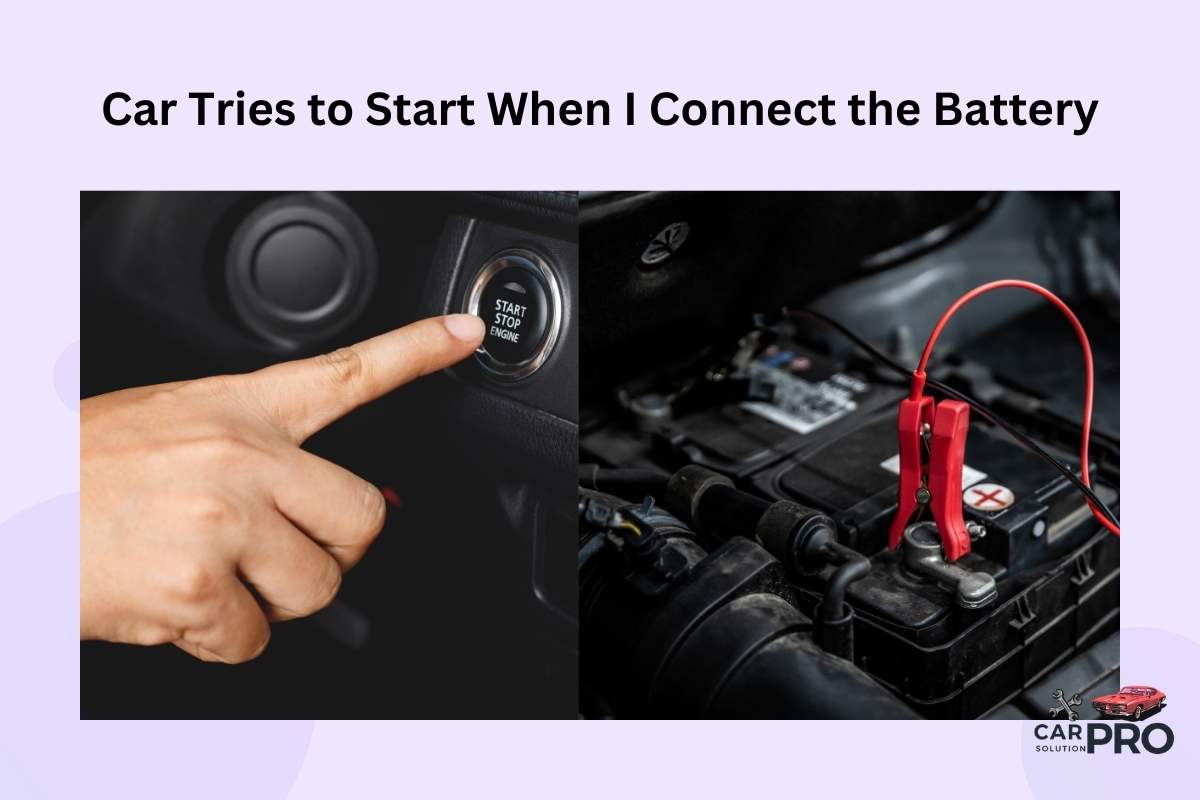When you connect your car battery and it tries to start on its own, it can be concerning. This issue often stems from a problem with the starter solenoid or electrical system. Your car may try to start when connecting the battery due to a defective solenoid or contact between wiring posts.
The starter solenoid acts as a relay in your car’s electrical system. It’s designed to receive a signal from the ignition switch when you turn the key. If it’s faulty, it might engage the starter motor without this signal. Other potential causes include faulty wiring, grounding issues, or electrical short circuits.
Fixing this problem may involve replacing the solenoid or addressing wiring issues. It’s important to diagnose the exact cause before attempting repairs. If you’re not comfortable working with car electrics, it’s best to consult a professional mechanic.
Key Takeaways
- Car starting when connecting the battery often indicates solenoid or wiring problems
- Diagnosing the exact cause is crucial before attempting repairs
- Professional help may be needed for complex electrical issues
Understanding Car Electrical Systems
Car electrical systems are complex networks that power crucial vehicle functions. They rely on several key components working together to start the engine and operate various electrical devices.
Battery Fundamentals
The car battery acts as the heart of the electrical system. It stores chemical energy and converts it into electrical energy when needed. Most car batteries provide 12 volts of power.
Batteries have two terminals: positive and negative. When connected, they complete an electrical circuit. Regular maintenance is important for optimal battery performance. This includes:
- Keeping terminals clean
- Checking water levels in non-sealed batteries
- Ensuring proper mounting to prevent vibration damage
A well-maintained battery typically lasts 3-5 years, depending on usage and climate conditions.
Starting System Components
The starting system turns the engine over when the key is turned. Its main parts are:
- Starter motor: Converts electrical energy to mechanical energy
- Starter solenoid: Acts as a switch to engage the starter motor
- Ignition switch: Activates the starting circuit when turned
When the ignition key is turned, it sends a signal to the starter solenoid. The solenoid then closes a circuit, allowing current to flow from the battery to the starter motor. This process causes the engine to crank and start.
If there’s an electrical fault, the car might try to start on its own when the battery is connected. This can be due to issues with the ignition switch or starter solenoid.
Diagnosing Starting Issues
When a car tries to start as soon as the battery is connected, it points to potential electrical problems. Proper diagnosis involves checking key components and connections.
Initial Assessment
Start by inspecting the battery connections. Make sure they’re clean and tight. Look for signs of corrosion on the terminals.
Check the battery voltage with a multimeter. A healthy battery should read around 12.6 volts.
Next, examine the starter solenoid. Listen for a clicking sound when turning the key. This can indicate a faulty solenoid.
Inspect the ignition switch for damage or wear. A worn switch may cause starting issues.
Common Electrical Issues
A faulty starter relay can cause the car to try starting on its own. This part controls power to the starter motor.
Check for shorts in the starting circuit. Damaged wiring can lead to unexpected starter activation.
Examine the alternator. A failing alternator may not charge the battery properly, leading to starting problems.
Test the starter motor itself. If it’s receiving power when it shouldn’t, it could be the root cause.
Look for loose or corroded ground connections. Poor grounding can cause various electrical issues, including starting problems.
Preventive Measures and Maintenance
Taking care of your car’s battery and starter motor can prevent unexpected starting issues. Regular checks and proper maintenance help keep these crucial parts in good working order.
Regular Battery Care
Clean battery terminals often to avoid corrosion buildup. Use a wire brush to remove any white or greenish deposits. Apply a thin layer of dielectric grease to the terminals after cleaning. This helps stop future corrosion.
Check battery connections regularly. Loose connections can cause starting problems. Make sure the cables are tight and secure.
Test the battery’s charge level every few months. A multimeter can measure voltage. A healthy battery should read around 12.6 volts when the car is off. If it’s lower, the battery may need charging or replacement.
Keep the battery’s outer case clean. Dirt can create a path for electricity to leak, draining the battery faster.
Starter Motor Maintenance
Listen for unusual noises when starting the car. Grinding or clicking sounds may indicate starter motor issues.
Check the starter connections periodically. Loose or corroded wires can prevent the starter from working properly. Tighten any loose connections and clean off corrosion.
Inspect the starter drive gear. This part engages with the engine’s flywheel. A worn gear can cause starting problems. Look for signs of wear or damage.
Keep the starter motor clean. Dirt and grime can affect its performance. Use a clean cloth to wipe it down when doing other under-hood maintenance.
Consider having the starter tested if the car has trouble starting. Many auto parts stores offer free starter testing services.
Step-by-Step Troubleshooting
When a car tries to start as soon as the battery is connected, it’s crucial to follow a systematic approach to identify and fix the issue. This process involves prioritizing safety, pinpointing the problem’s source, and addressing any connection-related concerns.
Safety First
Before beginning any troubleshooting, safety must be the top priority. The mechanic should wear protective gear like gloves and safety glasses. It’s important to work in a well-ventilated area to avoid inhaling harmful fumes.
The first step is to disconnect the battery’s negative terminal. This prevents accidental electric shocks and short circuits. Next, the mechanic should check for any visible damage or loose wires around the battery and starter area.
It’s also wise to have a fire extinguisher nearby, just in case. If the car has been running recently, allow it to cool down before starting work.
Isolating the Problem
To pinpoint the issue, the mechanic needs to focus on the starter system components. They should inspect the ignition switch for signs of wear or damage. A faulty switch can cause the car to try starting on its own.
Next, they should examine the starter solenoid. If it’s stuck in the engaged position, it can cause the starter to activate when power is connected. The mechanic can test the solenoid with a multimeter to check for proper function.
The starter motor itself should also be inspected. If it’s receiving constant power, it might try to engage as soon as the battery is connected. Wiring issues between the ignition switch and starter can also cause this problem.
Resolving Connection Issues
Addressing connection problems is often key to solving this issue. The mechanic should carefully inspect all wiring connections related to the starting system. They need to look for frayed wires, loose connections, or corroded terminals.
Cleaning battery terminals and cable ends can help ensure proper connections. If corrosion is present, a mixture of baking soda and water can be used to clean the affected areas.
The mechanic should also check the ground connections. A poor ground can cause electrical issues that might lead to the car trying to start on its own. Tightening or replacing ground straps can often resolve these problems.
When to Seek Professional Help
Getting expert help is crucial when your car has persistent starting issues. It can prevent further damage and save time and money in the long run.
Assessing Expertise Requirements
Car owners should seek professional help when basic troubleshooting fails to resolve starting problems. Persistent clicking sounds or a lack of response when turning the key indicate complex issues.
Unusual engine noises during start attempts also warrant expert attention. These symptoms often point to problems beyond simple fixes.
Electrical system issues, such as faulty alternators or starters, require specialized diagnostic tools. Mechanics have access to these tools and the expertise to use them effectively.
Choosing a Reliable Service
Selecting a trustworthy mechanic or auto repair shop is vital. Look for certified technicians with experience in electrical systems and engine diagnostics.
Read online reviews and ask for recommendations from friends or family. This helps identify reputable services with a track record of solving similar issues.
Consider mobile mechanics for convenience. They can diagnose and often repair the problem on-site, saving time and towing costs.
Compare quotes from multiple services to ensure fair pricing. Be wary of extremely low prices, as they may indicate subpar work or use of inferior parts.
Frequently Asked Questions
Cars starting on their own when connecting the battery can be alarming. This issue often stems from electrical problems or improper connections. Let’s explore some common questions about this situation.
Why does my car attempt to start by itself when I attach the battery?
This usually happens due to a short circuit in the starter solenoid. The short causes the starter to engage as soon as power is connected. It’s important to check the wiring and connections around the starter for any signs of damage or wear.
What could cause a car to engage the starter as soon as the battery is connected?
A faulty ignition switch is a common culprit. It may be stuck in the “start” position, sending a constant signal to the starter. Corroded or damaged battery cables can also create unintended electrical pathways, triggering the starter.
What should I check if my car starts on its own without the key?
Inspect the starter wiring for proper clearance. If wires are touching the wrong terminals, it can cause the car to start unexpectedly. Also, examine the ignition switch for signs of wear or damage.
Why does my starter make a clicking noise upon battery connection?
A clicking noise often indicates a weak battery or poor electrical connections. It could also mean the starter solenoid is engaging but lacks the power to turn the engine over. Check battery voltage and clean all connections.
Could connecting a car battery improperly cause the car to try to start?
Yes, reversing the battery connections can lead to unexpected electrical behavior. Always ensure the positive and negative terminals are correctly connected. Improper connections can damage the car’s electrical system.
How do I resolve an issue where an ATV starter engages as soon as the battery is connected?
For ATVs, check the starter relay and solenoid. These components can stick or fail, causing the starter to engage unexpectedly. Inspect wiring for any signs of damage or shorts. Replace faulty parts if necessary.
When you purchase a product through Amazon links on carsolutionpro.com, we may earn a small commission at no extra cost to you. This helps support the site and keep our content free. As an Amazon Associate, we earn from qualifying purchases made through our links.










